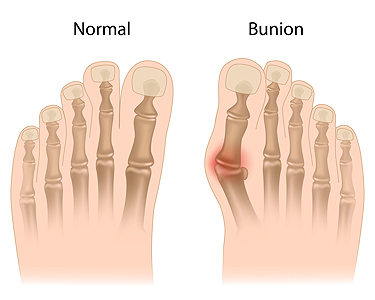
The foot condition known as a bunion is a progressive bone disorder. It is a lump on the side of the big toe that can happen from wearing shoes that do not have enough room in the toe area. Bunions may also occur due to genetic reasons. A bunion is considered a deformity and severe bunions can cause the other toes to shift toward each other. Some patients can develop bunions from overpronation, and this causes the foot to roll inward and can also be related to having flat feet. If the body's weight is unevenly distributed, an abnormal foot structure may develop which could lead to a bunion developing. Hypermobility is a condition that causes the bones to move more than they normally would and this may also result in a bunion. If you have a bunion, it is suggested that you confer with a podiatrist who can determine the proper plan of treatment for you.
If you are suffering from bunions, contact Anas Khoury, DPM of North Eastern Foot & Ankle Specialists. Our doctor can provide the care you need to keep you pain-free and on your feet.
What Is a Bunion?
A bunion is formed of swollen tissue or an enlargement of boney growth, usually located at the base joint of the toe that connects to the foot. The swelling occurs due to the bones in the big toe shifting inward, which impacts the other toes of the foot. This causes the area around the base of the big toe to become inflamed and painful.
Why Do Bunions Form?
Genetics – Susceptibility to bunions are often hereditary
Stress on the feet – Poorly fitted and uncomfortable footwear that places stress on feet, such as heels, can worsen existing bunions
How Are Bunions Diagnosed?
Doctors often perform two tests – blood tests and x-rays – when trying to diagnose bunions, especially in the early stages of development. Blood tests help determine if the foot pain is being caused by something else, such as arthritis, while x-rays provide a clear picture of your bone structure to your doctor.
How Are Bunions Treated?
- Refrain from wearing heels or similar shoes that cause discomfort
- Select wider shoes that can provide more comfort and reduce pain
- Anti-inflammatory and pain management drugs
- Orthotics or foot inserts
- Surgery
If you have any questions, please feel free to contact our office located in Passaic, NJ . We offer the newest diagnostic and treatment technologies for all your foot care needs.
